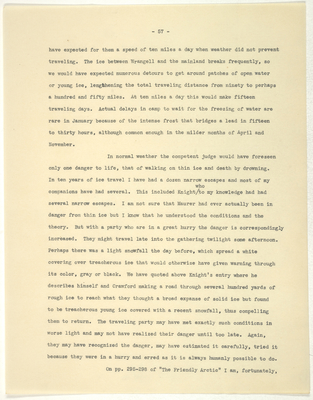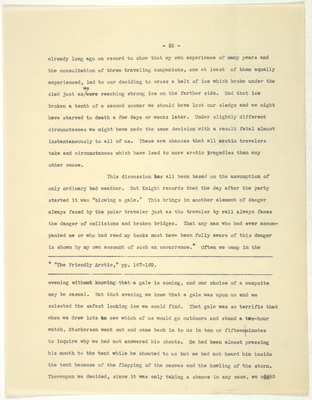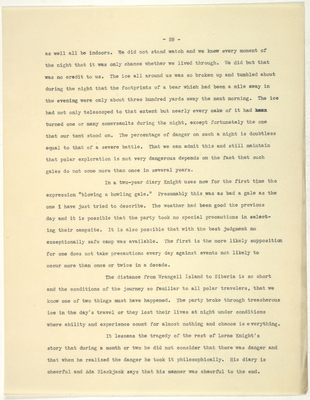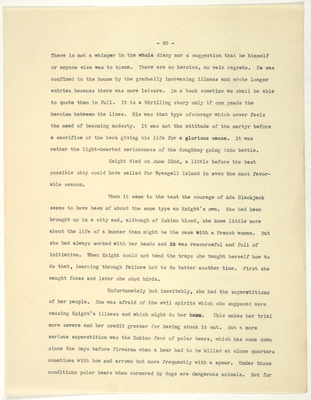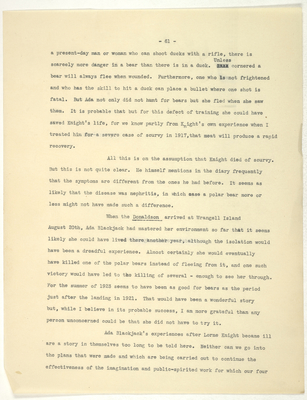Pages
stefansson-wrangel-09-25-006-056
- 57 -
have expected for them a speed of ten miles a day when weather did not prevent traveling. The ice between Wrangell and the mainland breaks frequently, so we would have expected numerous detours to get around patches of open water or young ice, lengthening the total traveling distance from ninety to perhaps a hundred and fifty miles. At ten miles a day this would make fifteen traveling days. Actual delays in camp to wait for the freezing of water are rare in January because of the intense frost that bridges a lead in fifteen to thirty hours, although common enough in the milder months of April and November.
In normal weather the competent judge would have foreseen only one danger to life, that of walking on thin ice and death by drowning. In ten years of ice travel I have had a dozen narrow escapes and most of my companions have had several. This included Knight/whoto my knowledge had had several narrow escapes. I am not sure that Maurer had ever actually been in danger from thin ice but I know that he understood the conditions and the theory. But with a party who are in a great hurry the danger is correspondingly increased. They might travel late into the gathering twilight some afternoon. Perhaps there was a light snowfall the day before, which spread a white covering over treacherous ice that would otherwise have given warning through its color, gray or black. We have quoted above Knight's entry where he describes himself and Crawford making a road through several hundred yards of rough ice to reach what they thought a broad expanse of solid ice but found to be treacherous young ice covered with a recent snowfall, thus compelling them to return. The traveling party may have met exactly such conditions in worse light and may not have realized their danger until too late. Again, they may have recognized the danger, may have estimated it carefully, tried it because they were in a hurry and erred as it is always humanly possible to do.
On pp. 295-298 of "The Friendly Arctic" I am, fortunately,
stefansson-wrangel-09-25-006-057
- 58 -
already long ago on record to show that my own experience of many years and the consultation of three traveling companions, one at least of them equally experienced, led to our deciding to cross a belt of ice which broke under the sled just as we were reaching strong ice on the farther side. Had that ice broken a tenth of a second sooner we should have lost our sledge and we might have starved to death a few days or weeks later. Under slightly different circumstances we might have made the same decision with a result fatal almost instantaneously to all of us. These are chances that all arctic travelers take and circumstances which have lead to more arctic tragedies than any other cause.
This discussion has all been based on the assumption of only ordinary bad weather. But Knight records that the day after the party started it was "blowing a gale." This brings in another element of danger always faced by the polar traveler just as the traveler by rail always faces the danger of collisions and broken bridges. That any man who had ever accompanied me or who had read my books must have been fully aware of this danger is shown by my own account of such an occurrence.* Often we camp in the
-------------------------------------------------------------------------------------------------------------- * "The Friendly Arctic," pp. 167-169. --------------------------------------------------------------------------------------------------------------
evening without knowing that a gale is coming, and our choice of a campsite may be casual. But that evening we knew that a gale was upon us and we selected the safest looking ice we could find. That gale was so terrific that when we drew lots to see which of us would go outdoors and stand a two-hour watch, Storkerson went out and came back in to us in ten or fifteen minutes to inquire why we had not answered his shouts. He had been almost pressing his mouth to the tent while he shouted to us but we had not heard him inside the tent because of the flapping of the canvas and the howling of the storm. Thereupon we decided, since it was only taking a chance in any case, we might
stefansson-wrangel-09-25-006-058
- 59 -
as well all be indoors. We did not stand watch and we knew every moment of the night that it was only chance whether we lived through. We did but that was no credit to us. The ice all around us was so broken up and tumbled about during the night that the footprints of a bear which had been a mile away in the evening were only about three hundred yards away the next morning. The ice had not only telescoped to that extent but nearly every cake of it had xxxx turned one or many somersaults during the night, except fortunately the one that our tent stood on. The percentage of danger on such a night is doubtless equal to that of a severe battle. That we can admit this and still maintain that polar exploration is not very dangerous depends on the fact that such gales do not come more than once in several years.
In a two-year diary Knight uses now for the first time the expression "blowing a howling gale." Presumably this was as bad a gale as the one I have just tried to describe. The weather had been good the previous day and it is possible that the party took no special precautions in selecting their campsite. It is also possible that with the best judgment no exceptionally safe camp was available. The first is the more likely supposition for one does not take precautions every day against events not likely to occur more than once or twice in a decade.
The distance from Wrangell Island to Siberia is so short and the conditions of the journey so familiar to all polar travelers, that we know one of two things must have happened. The party broke through treacherous ice in the day's travel or they lost their lives at night under conditions where ability and experience count for almost nothing and chance is everything.
It lessens the tragedy of the rest of Lorne Knight's story that during a month or two he did not consider that there was danger and that when he realized the danger he took it philosophically. His diary is cheerful and Ada Blackjack says that his manner was cheerful to the end.
stefansson-wrangel-09-25-006-059
- 60 -
There is not a whimper in the whole diary nor a suggestion that he himself or anyone else was to blame. There are no heroics, no vain regrets. He was confined to the house by the gradually increasing illness and wrote longer entries because there was more leisure. In a book sometime we shall be able to quote them in full. It is a thrilling story only if one reads the heroism between the lines. His was that type of courage which never feels the need of becoming modesty. It was not the attitude of the martyr before a sacrifice or the herb giving his life for a glorious cause. It was rather the light-hearted seriousness of the doughboy going into battle.
Knight died on June 22nd, a little before the best possible ship could have sailed for Wrangell Island in even the most favorable season.
When it came to the test the courage of Ada Blackjack seems to have been of about the same type as Knight's own. She had been brought up in a city and, although of Eskimo blood, she knew little more about the life of a hunter than might be the case with a French woman. But she had always worked with her hands and == was resourceful and full of initiative. When Knight could not tend the traps she taught herself how to do that, learning through failure hot to do better another time. First she caught foxes and later she shot birds.
Unfortunately but inevitably, she had the superstitions of her people. She was afraid of the evil spirits which she supposed were causing Knight's illness and which might do her harm. This makes her trial more severe and her credit greater for having stuck it out. But a more serious superstition was the Eskimo fear of polar bears, which has come down since the days before firearms when a bear had to be killed at close quarters sometimes with bow and arrows but more frequently with a spear. Under those conditions polar bears when cornered by dogs are dangerous animals. But for
stefansson-wrangel-09-25-006-060
- 61 -
a present-day man or woman who can shoot ducks with a rifle, there is scarcely more danger in a bear than there is in a duck. Unless cornered a bear will always flee when wounded. Furthermore, one who is not frightened and who has the skill to hit a duck can place a bullet where one shot is fatal. But Ada not only did not hunt for bears but she fled when she saw them. It is probable that but for this defect of training she could have saved Knight’s life, for we know partly from Knight’s own experience when I treated him for a severe case of scurvy in 1917, that meat will produce a rapid recovery.
All this is on the assumption that Knight died of scurvy. But this is not quite clear. He himself mentions in the diary frequently that the symptoms are different from the ones he had before. It seems as likely that the disease was nephritis, in which case a polar bear more or less might not have made such a difference.
When the Donaldson arrived at Wrangell Island August 20th, Ada Blackjack had mastered her environment so far that it seems likely she could have lived there another year, although the isolation would have been a dreadful experience. Almost certainly she would eventually have killed one of the polar bears instead of fleeing from it, and one such victory would have led to the killing of several - enough to see her through. For the summer of 1923 seems to have been as good for bears as the period just after the landing in 1921. That would have been a wonderful story but, while I believe in its probable success, I am more grateful than any person unconcerned could be that she did not have to try it.
Ada Blackjack's experiences after Lorne Knight became ill are a story in themselves too long to be told here. Neither can we go into the plans that were made and which are being carried out to continue the effectiveness of the imagination and public-spirited work for which our four
